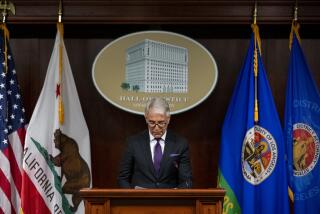NEWS ANALYSIS : ORANGE COUNTY IN BANKRUPTCY : Was Citron a Wheeler-Dealer or a Naive Public Official? : Investments: Some key points of former treasurer’s testimony seemed to be contradicted in his responses to later questions--or were aggressively disputed by Merrill Lynch.
- Share via
SACRAMENTO — Amid the barrage of conflicting statements and seeming self-contradictions offered Tuesday by the key players in Orange County’s financial debacle, the central question appeared to go unanswered: Who was the real Bob Citron, and how much did he really know about managing money?
Was the longtime Orange County treasurer a mild-mannered, naive public official led to investment slaughter by savvy Wall Street brokerages? Or was he a shrewd financial wheeler-dealer who believed in his own magic and listened to no one but himself?
The blame for the $2.02-billion loss in the county’s investment fund and the county’s subsequent bankruptcy filing cannot be properly affixed without settling that debate, but state senators questioning a long line of witnesses Tuesday may not have gotten much closer to the answers they and Orange County taxpayers want.
Instead, the legislators slogged through a morass of self-serving testimony that often did not hold up well under scrutiny. And while the questioning revealed numerous instances in which the letter of the law apparently was not followed in the transactions within and supervision of the county’s investment fund, no “smoking gun” was evident.
That is, nothing was said that could be immediately seized upon by prosecutors, who are sure to study Tuesday’s testimony carefully as state and federal investigations of the county disaster continue.
“I don’t know any more than I knew before,” said Newport-Mesa Unified School District trustee Judy Franco, who sat in the audience of the hearing room listening for more than eight hours. “It’s kind of a ‘he said, you said’ type of an explanation.”
Citron set the tone for the hearing, portraying himself as a victim who “relied on the expert advice of financial professionals.”
But some of the key points of his testimony seemed to be contradicted in his responses to later questions--or were aggressively disputed by Merrill Lynch, the brokerage from which Citron bought the bulk of his doomed portfolio’s securities:
* Citron referred to himself as a treasurer who never graduated from college, was forced to learn on the job and thus “placed a great deal of reliance on the advice of market professionals.”
But when asked later in his testimony why he had no contingency plan to deal with the devastating effect of rising interest rates on his $20-billion, highly leveraged investment portfolio, he said: “I was so sure of what I was doing, based on the many years of success that I had.”
Senators did not ask Citron about a briefing Merrill Lynch gave him in February, 1994, detailing that the county’s high-risk “derivative” bonds would decline in value by $270 million for every one-point rise in interest rates. That report followed the first of last year’s six rate increases by the Federal Reserve.
* Citron referred only briefly to the Merrill report, but throughout his remarks he sought to tie Merrill closely to his ill-fated strategy of borrowing short-term to buy long-term bonds and complex derivatives. “At least to this lay person, Merrill Lynch acted as a financial adviser to Orange County,” he said.
Yet Citron also testified that he called daily for advice from Albert J. De Spirito, an executive at rival brokerage Dean Witter Reynolds in Los Angeles. Indeed, De Spirito was Citron’s first call each morning, said Michael G. Stamenson, the Merrill broker who got most of Orange County’s bond business. Stamenson, based in San Francisco, said he was second on Citron’s list of calls.
Citron did not volunteer, and senators did not ask, what kind of advice De Spirito may have provided regarding the portfolio’s management.
(Contacted at his San Marino home late Tuesday, De Spirito declined comment on his dealings with Citron.)
* Asked why he took the extreme risks that he did with the county portfolio, Citron said there was “great pressure put on me and others” to help the county earn more interest income and thereby avoid budget cuts.
But pressed for examples of that pressure, Citron said he could recall only “several times” when he said county officials had “through verbal contact” asked him to earn more money.
* Citron painted Stamenson as the architect of the portfolio’s strategy of investing in high-risk derivative securities. “I remember it as if it was yesterday,” Citron said, referring to the first derivative security he bought from Stamenson, in 1991.
But later, Orange County Assistant Treasurer Matthew Raabe testified that he and Stamenson had met with Citron jointly in September or October to discuss Raabe’s concerns about the portfolio’s heavy use of borrowed money to buy derivatives.
“Stamenson was helpful in what we were trying to do” in addressing the portfolio’s risk, Raabe said. But Citron, he said, chose not to heed their concerns.
* Though he had been treasurer for 24 years, Citron said he was unaware of state law that required him to submit specific details of his investments to the County Board of Supervisors monthly. Neither could county board Chairman Gaddi Vasquez explain why the board had not demanded those reports.
For its part, Merrill Lynch reiterated the position it has stood by since the bankruptcy filing, which is that the firm “did not create or direct the county’s investment strategy” even though it acknowledges having sold between 60% and 70% of the securities the county owned in the fund.
Merrill officials, in written material submitted to the Senate Special Committee on Local Government Investments, described Citron as a “sophisticated investor.” Moreover, Merrill insisted that county supervisors were well aware of Citron’s strategy, which used borrowed money to intensify his bet on falling interest rates--a bet largely responsible for the county fund’s collapse as interest rates surged last year.
The county, in suing Merrill for damages from the fund’s collapse, has argued that the firm earned many millions of dollars in fees from the county, and had a responsibility to inform the supervisors directly of the high-risk nature of Citron’s strategy. Merrill has argued that it had no such responsibility, and that in any case Citron had kept the board abreast of his tactics.
But the evidence Merrill cited regarding Citron’s disclosures to the board was a boilerplate passage in his 1992-1993 financial statement. That report referred to the fund’s use of “reverse repurchase agreements . . . (as) a strategy that utilizes leverage, and also involved in this strategy is the use of structured or floating interest rate securities.”
Stamenson, testifying late in the day, described himself as “one account executive among a number of different brokerage firms that provided Mr. Citron with information and opinions and competed for Mr. Citron’s business.”
Far from being an inexperienced investor, Citron was “fully versed in the advantages and risks associated with the securities that he purchased from brokerage firms, including Merrill Lynch,” Stamenson said. He added: “I learned a lot from him, since he was doing reverse repurchase transactions before I even knew what the term meant.”
Yet Stamenson failed to expand on Merrill’s reasoning why, despite its stated concerns about Citron’s growing use of leverage in the portfolio last year, the firm still agreed to underwrite a $600-million county note offering in July, the proceeds from which were used to support the fund.
Merrill officials have insisted that they were simply serving their customer. But the deal, originally to be underwritten by Paine Webber, was taken over by Merrill after it stepped in and offered Citron a more lucrative deal.
In part, Tuesday’s testimony could be viewed as a dress rehearsal for the civil trials likely in the wake of the county’s fiscal calamity--and the criminal prosecutions that could develop from a number of ongoing investigations.
In that light, securities attorneys said Tuesday that Citron’s stance--that he was following Merrill Lynch’s advice--is aimed not only at portraying the securities firm as the architect of the county’s failed investment strategy but in showing that in his own actions he relied in good faith on professional guidance.
“He’s saying he was informed by people with good reputations,” said Stanley Arkin, a defense attorney with practices in Los Angeles and New York.
Other experts were skeptical of Citron’s contention.
“It sounds like what he’s doing is saying he’s like the old lady in tennis shoes who’s victimized by the investment house,” said one prominent securities lawyer who asked to remain unidentified. “It might work, but the problem is that over the years, Citron portrayed himself as some sort of genius. Holding himself out now as a naive pussycat is going to be a hard one to sustain.”
Times staff writers Michael A. Hiltzik in Orange County and Jesus Sanchez in Los Angeles contributed to this story.
More to Read
Sign up for Essential California
The most important California stories and recommendations in your inbox every morning.
You may occasionally receive promotional content from the Los Angeles Times.












